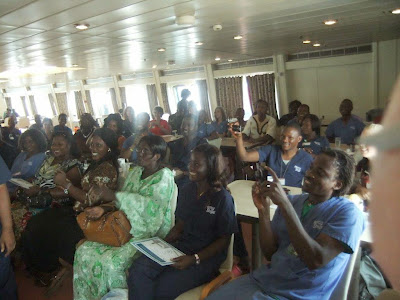Journey with us through West Africa, living and working on a hospital ship-the good, the bad and the ugly!
Preamble
We are a family of three; Andrew, Jodie and Jessica (aged 18) from Tasmania, Australia who are currently serving in Douala, Cameroon, Central Africa on the M/V Africa Mercy, the largest non-governmental hospital ship in the world, through Mercy Ships International. God has called us on a journey that has been many years in the making. For this season we call Africa home, as we seek to bring hope and healing to the poorest of the poor.
Search This Blog
Wednesday, August 21, 2013
Monday, August 05, 2013
Mangos give you Malaria!
You can catch malaria from eating mangoes or when the moon is full. If you have scabies in your home you need to get rid of everything and move house. HIV/Aids is spread by touch. If your baby has diarrhea you shouldn't give them anything to eat or drink. Babies only need two vaccinations. Coconut water is the best food for a baby up to two years old. It's okay for animals to directly share our drinking water. A person can get worms by a being sneezed on by an infected person.
With the scary combinations of traditional medicine, ignorance and poverty, people in West Africa are dying every day from preventable diseases. There my challenge lay. To change the mindset and to educate over 100 hospital day workers in community health education, on the Africa Mercy during our Guinea field service. No, I am not a nurse or a doctor. My only claim to the health care system in that I was privileged enough to be born into a highly developed nation with trained specialists at every corner.
Like a proud mother hen watching over her chicks I witnessed the education and knowledge of the day workers grow over the ten months we were in Guinea. One of those rare moments that overwhelm you was watching Marcus, a hospital day worker, sitting on a stool in the wards. He had in his hands the giant flash cards we use for teaching and he was meticulously teaching a group of VVF ladies, their gowns flapping around their ankles, listening intently. But the beauty for me was in the translation-the teaching was simultaneously being translated into four different languages. Then I knew that I had achieved something special. Even if those women didn't remember much of what they were taught, maybe, just maybe they might remember enough to save the life of their child one day.
The idea was simple-nine different topics with accompanying multiple choice test. Nurses were recruited as teachers and classes were conducted, with the aid of flash cards, one to three times a week, rotating though the nine topics. Once the test was passed the day worker was then eligible to teach patients the same information in the patients first language. The logistics....so much more complicated. The laminated topic packs were all in disarray and many of them contained contradicting information. The tests need to be made, statistics kept, teachers recruited, meetings, emails, marking and returning of over 1000 test, spread sheets etc., etc. In the beginning the rewards were few and the hours were many and at times, I felt as if I wanted to walk away and that I just couldn't cope if one more day worker called out to me down the halls of the hospital........ "Jodie, I have a question". Painstakingly I dealt with each and every enquiry and each and every request in order to honour these men and women in their quest for knowledge and their desire to better their community. Mummy Jodie I became known as. The honour was all mine....
 |
Community Health Education classes (CHE) taking place in the Africa Mercy dining room. |
 |
Another class. |
 |
Nurse Lydia teaches on Malaria. |
 |
The multiple choice Malaria test. |
 |
Above I am presenting certificates to the Hope Centre day workers who toiled to complete each of the nine topics. Well done Hope Centre day workers! |
 |
After the presentation we celebrated further with some traditional West African praise and worship. It was raw and beautiful. |
Subscribe to:
Comments (Atom)
















